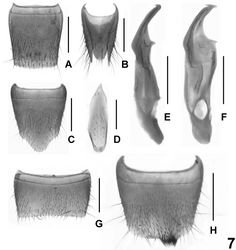Lathrobium obstipum
| Notice: | This page is derived from the original publication listed below, whose author(s) should always be credited. Further contributors may edit and improve the content of this page and, consequently, need to be credited as well (see page history). Any assessment of factual correctness requires a careful review of the original article as well as of subsequent contributions.
If you are uncertain whether your planned contribution is correct or not, we suggest that you use the associated discussion page instead of editing the page directly. This page should be cited as follows (rationale):
Citation formats to copy and paste
BibTeX: @article{Peng2012ZooKeys251, RIS/ Endnote: TY - JOUR Wikipedia/ Citizendium: <ref name="Peng2012ZooKeys251">{{Citation See also the citation download page at the journal. |
Ordo: Coleoptera
Familia: Staphylinidae
Genus: Lathrobium
Name
Lathrobium obstipum Peng & Li sp. n. – Wikispecies link – ZooBank link – Pensoft Profile
Type material
(17 ♂♂, 5 ♀♀). Holotype: ♂, labeled ‘CHINA: Zhejiang Prov. / Qingyuan County / Baishanzu N. R. / 27°45'N, 119°13'E / 22–23.ix.2008, alt. 1,500 m / Tang & Zhang leg.’. Paratypes: 10 ♂♂, 5 ♀♀, same label data as holotype; 3 ♂♂, same label data, but ‘27°45'N, 119°12'E / 6.v.2004, alt. 1,400–1,700 m / Hu, Tang & Zhu leg.’; 3 ♂♂, same label data, but ‘27°44'N, 119°13'E / 21.viii.2004, alt. 1,250–1,650 m / Hu, Tang & Zhu leg.’.
Description
Measurements and ratios:BL 6.34–7.23, FL 2.84–3.12, HL 0.65–0.71, HW 0.87–0.91, PL 1.11–1.19, PW 0.99–1.06, EL 0.76–0.81, HL/HW0.73–0.78, HW/PW 0.86–0.90, HL/PL 0.56–0.62, PL/PW 1.11–1.15, EL/PL 0.67–0.69.
Habitus as in Fig. 2B. Similar to Lathrobium baishanzuense, except for the lighter coloration of legs and antennae, the smaller body size, sparser punctation on the head and pronotum, and the somewhat broader impunctate midline on pronotum.
Male. Sternites III-VI unmodified; posterior margin of sternite VII (Fig. 7G) nearly truncate; posterior margin of sternite VIII (Fig. 7H) truncate and with tuft of short setae in asymmetric position; sternite IX (Fig. 7D) nearly symmetric; aedeagus (Fig. 7E, 7F) with asymmetric, apically forficate ventral process, without sclerotized dorsal plate, and without sclerotized spines in internal sac.
Female. Posterior margin of tergite VIII (Fig. 7A) weakly convex; sternite VIII (Fig. 7C) longer than that of male, posterior margin strongly convex; tergite X (Fig. 7B) convex apically, not reaching anterior margin of tergite IX (Fig. 7B).
Distribution
East China: Donggong mountain range.
Etymology
The specific epithet (Latin, adjective: awry) alludes to the chaetotaxy of the male sternite VIII.
Comparative notes and comments
The new species is similar to Lathrobium sheni Peng & Li, 2012 from Jiulongshan in having similarly shaped male sternites VII and IX. The new species can be distinguished from Lathrobium sheni by a cluster of short setae on the posterior margin of the male sternite VIII and the distinctly flattened aedeagus. In Lathrobium sheni, the male sternite VIII has two rows of dense setae and the aedeagus is stout.
Lathrobium obstipum evidently represents a different lineage than the other species recorded from Baishanzu, since it does not share their derived modifications of the anterior male sternites. It is additionally distinguished from them by the smaller body, yellowish brown legs, the unmodified male sternite III-VI, the nearly truncate posterior margin of the male sternites VII and VIII, and the distinctly flattened aedeagus without a sclerotized dorsal plate.
Original Description
- Peng, Z; Li, L; Zhao, M; 2012: Five new apterous species of the genus Lathrobium Gravenhorst (Coleoptera, Staphylinidae, Paederinae) from the Baishanzu Natural Reserve, East China ZooKeys, 251: 69-81. doi
Images
|

